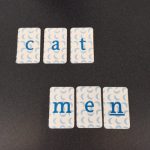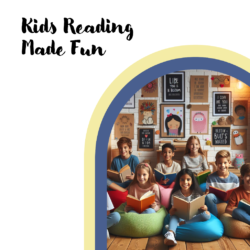Phonics Based Reading in a Nut Shell
When I sat down to write this page, I realized that many of you probably don’t truly have a full understanding of what phonics based reading is. Some of you may have never even heard of the word “phonics” unless you teach in an elementary school or work at a learning center for children! Believe me, this is totally understandable!

For many of you, hearing this word for the first time is probably comparable to how I felt when I was sitting in my lender’s office before I bought my first house. I sat in horror as she tried to explain, (in incomprehensible words, of course) terminology that I couldn’t even imagine spelling, much less try to understand!

Phonics at Its Core… 
Webster’s Dictionary defines phonics as- a method of teaching people to read and pronounce words by learning the sounds of letters, letter groups, and syllables. Basically put, it is the essence of associating each letter with a particular sound, or in some instances, sounds. Once children learn the basics, they will be more able to break unknown words apart, sound them out, and put them back together as a whole!

Still Sound Confusing?
Let me give you just a basic example that a kindergartner may use in his/her reading class. Let’s take the word: mat. Once kids learn and understand what sound each of the letters in this word makes, they can easily break them apart–m-a-t, sound them out, and put them back together to form the word: mat.
With my younger children, I use what I call “letter tiles” when we are learning to read new words. You might be able to find them at a teachers’ resource store, or you can make them on your own. All you have to do is cut index cards into individual squares 1″ by 1″ or 2″ by 2″, whichever you prefer. Label each square with a lower case letter. Then, these can serve as the manipulatives to help your kids get started with reading basic words! (I’ll be explaining some exercises that will help children learn phonetically in a later post!)
Affiliate Disclosure
I would like to be open and transparent with you, as parents and caregivers. When you buy something from the websites listed on my site, I may receive an affiliate commission. I never recommend poor quality products, or create false reviews to make sales. The opinions I express are not representative of the companies that create these products. It is my intention to explain products in such a way that you can make informed decisions on which ones best suit your needs.
As an Amazon affiliate, I earn commissions.
Within the pages of my site, I will be sharing different things that you can do at home, as well as awesome reading programs that will get your child up and reading successfully, all while learning that READING IS FUN!
I would love to hear from you! If you ever need to contact me, please feel free to leave a comment below and I would be more than happy to get back with you! And, as always…Happy reading to you and your child!
Blessings:)
Suzi

Awesome insight into children’s learning! I used phonics with my children when they were learning to read. Well thought out ideas! What an essential site for parents and children!! As an author, I really appreciate your views! Erin
Thanks so much, Erin! I’m so glad that you incorporated phonics into your childrens’ eduacation programs:) I’m sure they are extremely great readers, and hopefully love literature! I really appreciate you commenting:)
Blessings:)
Suzi
Hi Suzi, great post on phonics! I too have taught young children for many years and know the importance of learning individual sounds, the beginning of early reading. Yes, true, a lot of parents don’t really understand the word and you have explained it clearly. Well done!
Thank you, Sharon, for your nice comment! It’s nice to meet a fellow teacher:) I think that many parents don’t understand the value of phonics because they have never taught it. This is probably how I would feel if I had to work in an accounting office! However, the value of teaching the basics to children when they are young is incredibly important. This is the foundation for their rests of their lives! Thank you, again, for your sweet comment, and for understanding how important phonics is!
Blessings:)
Suzi
Wow, so much interesting information here. Although I don’t have children myself, I always wondered what phonics reading was about, so now I can say I learned something new.
Keep up with the good work, Suzi, you are doing great! 🙂
Thanks so much for stopping by, Sergio! I appreciate your kind words:) Teaching children to read is the one thing I know about and enjoy doing! What would the world be like without kids?!! Again, I sincerely thank you for your encouraging words!
Blessings:)
Suzi
Suzi, when my son joined primary school some 11 and half years ago (it sounds scary if I put it like that, how quick time goes by!!), phonic method was relatively new in the British schooling system. To me it sounded vital, as when I learnt English in my 20s , shortly before i moved to UK but mostly when I started living and working in UK, phonics were the sounds that helped me memorise English pronunciation. But then again, I came from a mother tongue, Italian, which is solely phonic!
Yet, it was amazing the positive impact that the phonic system made on my son’s learning.
As a bilingual, and as with any other primary skills, that meant that he started reading fluently a few months later than the other kids in his class. But, when he started reading, he took off right and proper – as if something overnight had clicked in his head, and off he was!!
You could not find, therefore, a bigger supporter of the phonic system in anybody else but me!!
Wow, Giulia:) What a truly amazing story! I’m so glad that your son became fluent in reading due to the phonics program that he was enrolled in:) I am a firm believer in teaching phonics. I know that it may not work with every single child. However, a great majority of my kiddos have really flourished as they learned the sound/s that each letter makes, and how to break words apart, as well as put them back together. I’m so thankful that your son really took off! Hopefully, he still enjoys reading today:) I think teaching phonics has made a huge difference in so many children’s lives; and for that, I am very thankful!
Blessings:)
Suzi
My sister has two daughters and it is a struggle to get them to enjoy reading. They prefer to run around and play with their toys instead. Phonics sounds like an excellent method for helping them learn to love reading.
I do have a question though. Do you know of any other techniques that result in a love of learning? I look forward to hearing your thoughts. Thank you in advance and I hope you have a great day!
Hi Alex:) Thanks so much for your insightful comment and question! I believe that one of the hardest things parents face in regards to their child’s education is trying to motivate them to “want” to read and learn new things. In this day and age, it seems that everything revolves around technology and instant gratification and rewards. Why not try an iPad with educational apps. and books installed? Many of the kiddos that I work with would much rather read on a tablet, rather than hold an actual book in their hands. Also, several of the educational apps come equipped with instant rewards. So, kids are learning, while being rewarded at the same time! It’s the same for adults. There has to be a balance between work and play! That’s what makes life more meaningful. Thank you, again, for your comment! Best wishes to your nieces as they continue on the pathway of learning:)
Blessings:)
Suzi
Dear Suzi Thank you very much for this article. I have two sons: one was kindergartener last year, and the other one is this year. They both do not speak English as their native language and struggled a lot when started to learn how to read. I never was a student at USA school and it was a real challenge to teach them to read. I am pretty sure that this article will be very helpful to many moms and their kindergarteners.
Hi Alla:) I appreciate your feedback on this post! I hope that it will help your sons as they learn to read:) Please let me know if there is anything I can do to help! I wish all the best to you and your boys as they continue on this journey of learning:)
Blessings:)
Suzi
Hi Suzi,
When I was little, my parents taught me to read with phonics. I still remember my Dad talking about it through the years. He insisted it was the way to go and the best way to teach kids to read. I don’t know where he picked up his strong opinion on this but I sure remember it! When I was in college he volunteered to read to kids in a program in our local town to help them learn.
There was a time I guess (though I do not know exactly when or how long it lasted or if it is still popular) of teaching kids to read by just memorizing words instead of sounding them out. My parents thought this was more difficult and not a good way to teach kids. I agree. When I have kids I will use phonics to teach them too. It just makes sense!
I look forward to reading your suggestions here!
Thanks,
Jessica
Hi Jessica:) Thank you so much for sharing your story! Your parents were definitely smart by teaching you to read using phonics. I firmly believe that phonics gives kids such a solid foundation for reading, and sets them up for success later on in life. I was a teacher for 20 years, and when I think back to how the teaching trends changed during that time, it amazes me. Actually, it shocks me! Now days, a majority of the school districts have moved away from teaching reading using phonics. As you mentioned, they teach children to read using sight words. I own and operate a small tutoring business, and it makes me extremely sad to see the amount of kiddos who are coming to me without the ability to break apart the words they don’t know how to read, and put them back together to form the actual word. I think this way of teaching is actually setting kids up for failure. Don’t get me wrong. Phonics doesn’t work for every single word, but for a majority of them, it does. This is why I believe that teaching reading with phonics is so important! Thank you, again, for your insightful comment! I appreciate it:)
Blessings:)
Suzi
Suzi,
Do you know what their justification is for teaching sight reading instead of phonics? I just don’t understand the logic. It seems so simple to see that phonics just makes sense!
Jessica
Hi Jessica:) I have no idea why so many of the school districts have moved away from teaching phonics. I was trained in college to teach children to read using mainly phonics. However, when I was teaching 1st grade my very first year, my school district came in and told my team that we were to throw out our phonics and use “Whole Language” to teach reading. They even came in and trained us on how to teach using this new method. What a nightmare:( I think I had about 6 kids reading by mid year, and only a few more by the end of the year. The next year, the district allowed us to incorporate some of the phonics back into our reading program. What a huge difference it made! I wholeheartedly believe in the use of phonics to help kids succeed at reading! I think it comes from 30 years of teaching experience to know what works and what doesn’t! Thanks, again, for your input! I really appreciate it:)
Blessings:)
Suzi
I have to say, that if it weren’t for a few special people teaching me how to pronounce the simplest of words, I wouldn’t be able to read at all. Being dyslexic, it was very hard for me to understand and comprehend even the smallest of words. It was some people like you Suzi, to help me through. So on behalf of my tutor’s, I thank you
Naomi
Thank you, Naomi, for your sweet comment:) I’m so glad that you had some wonderful tutors to encourage you to continue learning! I’m also so thankful that you were able to succeed at learning, despite having dyslexia:) So many kids in this day and age don’t have the entourage of resources as you did, and seem to be overlooked by the “system.” I wish you all the best as you continue down the pathway to learning!
Blessings:)
Suzi